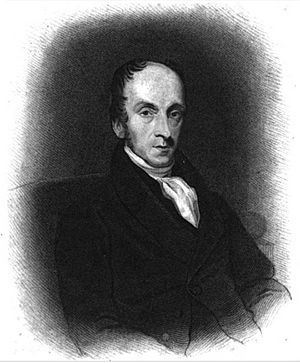Richard Watson (Methodist) facts for kids
Richard Watson (born 1781, died 1833) was an important British Methodist leader. He was a theologian, which means he studied and wrote about religious ideas. Richard Watson was a key person in the Wesleyan Methodist Church during the early 1800s.
Contents
Richard Watson's Life Story
Early Years and School
Richard Watson was born on February 22, 1781. His birthplace was Barton-upon-Humber in Lincolnshire, England. He was one of eighteen children in his family. His father, Thomas Watson, worked as a saddler.
Richard's family followed Calvinist beliefs. However, Richard chose a different path. As a boy, he started going to a Wesleyan chapel. He officially joined the Wesleyan Methodists in 1794.
In 1791, Richard began attending Lincoln Grammar School. Later, in 1795, he started training to be a joiner in Lincoln.
His Career as a Preacher
In 1796, Richard Watson gave his first sermon. He then moved to Newark-on-Trent. There, he worked as an assistant to Thomas Cooper, who was a Wesleyan preacher.
Richard joined the Methodist "itinerancy" in 1796. This meant he became a traveling minister. By 1801, he was a full-time minister. During this time, he worked in places like Ashby-de-la-Zouch and Derby.
In 1801, Richard married Mary Henslow. She was from Castle Donington. Mary's father was also a Methodist preacher. Richard and Mary had two children together.
For a short time, Richard left the Wesleyans. He joined the Methodist New Connexion in 1803. He became assistant secretary for their conference in 1805. By 1807, he was fully admitted as a minister there. He worked in Stockport and Liverpool.
In 1812, Richard Watson returned to the Wesleyan Methodists. He was given his old position back. He served in Wakefield and Hull from 1814 to 1816.
Missionary Work and Leadership
Richard Watson was very active in the church. In 1813, he helped create a plan for a new missionary society. This plan was approved by the conference.
From 1821 to 1827, he worked in London. He was one of the main secretaries for the Wesleyan Missionary Society. After working in Manchester, he returned to London. He served as a secretary for the missionary society again from 1832 to 1833.
Richard Watson's Passing
Richard Watson passed away in London on January 8, 1833. He was buried in the graveyard behind the City Road Chapel in London.
Richard Watson's Beliefs and Writings
Richard Watson was a strong Methodist. However, he also respected the Anglican Church. He called it "the mother of us all." He wanted Methodism to stay friendly with the Anglican Church.
Richard Watson was a very talented writer. He was also a deep thinker about religious ideas. He believed in the Trinity (God as Father, Son, and Holy Spirit). He also followed Evangelical Arminian teachings.
One of his most important works was Theological Institutes. He worked on it from 1823 to 1829. This book helped explain John Wesley's ideas. It became a standard book for understanding Methodist doctrine.
In 1831, he wrote a Biblical and Theological Dictionary. This book was very complete for its time. He also wrote a well-known book called Life of Rev. John Wesley in 1831.
Richard Watson was also a strong opponent of slavery in Britain. He worked to end slavery, though he did not support immediate freedom for all enslaved people.
 | Kyle Baker |
 | Joseph Yoakum |
 | Laura Wheeler Waring |
 | Henry Ossawa Tanner |


